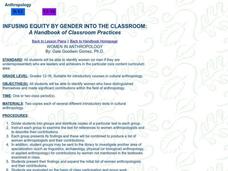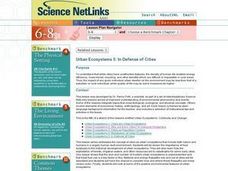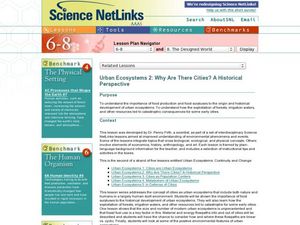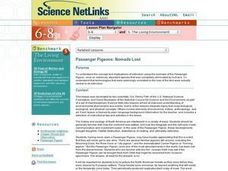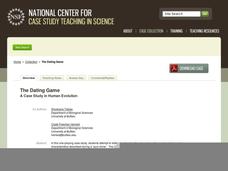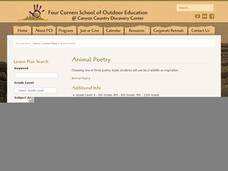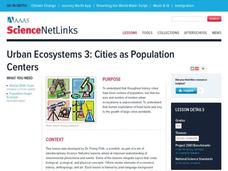University of North Carolina
Anthropology
Anthropologists ask the question that everyone wants answered: what does it mean to be human? An online handout provides a brief introduction to the study of anthropology and outlines three common types of anthropology writing...
Curated OER
Human Evolution: Biology, Bones
Learners will love a weeks worth of bone study. They use bones and characteristics of bones to explore the evolution of hominoids. Bones are compared, categorized, and considered. A great way to bring physical anthropology and material...
Curated OER
Women in Anthropology
Twelfth graders identify women who have excelled in anthropology. They present their findings which are compiled with other students' research to produce a list of women anthropologists.
Curated OER
WOMEN IN ANTHROPOLOGY
Twelfth graders explore women (or men if they are underrepresented) who are leaders and achievers in the particular core content curriculum area. In this Anthropology lesson, 12th graders study the women who have distinguished...
Curated OER
Exploring Explorations-Ocean Exploration
Students learn about Earth's deep ocean discoveries and their benefits. In this ocean exploration lesson, students review previous explorations of the Earth's deep oceans and learn about the discoveries of the past.
Curated OER
Biology: Howler Monkeys Tell All
Students examine a PBS special about howler monkeys as an introduction to scientific forensic investigative methods. In groups, they conduct a host of experiments containing clues which point to discovery. By challenging assumptions,...
Curated OER
The Empirical Challenges of Racial Classification
This lesson will help students examine their preconceptions and assumptions about racial categories and understand the impossibility of constructing a consistent system of human racial classification.
Curated OER
Urban Ecosystems 5: In Defense Of Cities
Students explain that while cities have unattractive features, the density of human life enables energy efficiency, mass transit, recycling, and other benefits which are difficult or impossible in rural areas. This is the fifth in an...
Howard Hughes Medical Institute
Got Lactase? The Co-Evolution of Genes and Culture
Does the human body evolve as quickly as human culture? With a stellar 15-minute video, explore the trait of lactose intolerance. Only about 1/3 of human adults seem to still have the enzyme lactase and therefore, the ability to digest...
Curated OER
Spaceship Earth
Students develop an understanding of our planet as a system by designing a very-long-duration space mission in which the life-support system is patterned after that of earth.
Curated OER
Urban Ecosystems 4: Metabolism of Urban Ecosystems
Students discover that material and energy uses by a city come from outside the city boundaries. They realize that the pathway of these material is linear instead of cyclical as they are in natural ecosystems.
Curated OER
Urban Ecosystems 2: Why Are There Cities? A Historical Perspective
Students investigate the importance of food surpluses to the historical development of urban ecosystems.
Curated OER
PASSENGER PIGEONS: NOMADS LOST
Students explore the concept and implications of extinction using the example of the Passenger Pigeon, once an extremely abundant species that was completely eliminated by humans.
National Center for Case Study Teaching in Science
The Dating Game
Learn about the human's ancestors through the (carbon) Dating Game. Use the script to have your high schoolers act out one round of the game. Once they have the idea, they will research another human ancestor and play a second round the...
Curated OER
Ecosystem Services - Water Purification
Students see that ecosystems provide services to people that are essential to life as we know it. Reporters (drops of water) could interview the trees and soil in the surrounding ecosystems for news stories on how they helped keep the...
Curated OER
Water Purification
Students use the example of natural water purification to show that healthy ecosystems provide services to people that are essential to life as we know it.
Curated OER
Animal Poetry
Fourth graders write poems that use local wildlife as their inspiration. After a class discussion which produces a list of wildlife that pupils have seen in their town, a review of three types of poetry ensues. They look at how haiku,...
Curated OER
Great Rivers 2: The Ups and Downs of River Flooding
Second in a three-part lesson on rivers, this lesson focuses on the flooding that occurs in riparian locations. First, learners take a look at facts about the Amazon River. They read online materials and fill in a worksheet as they...
Curated OER
Urban Ecosystems 2: Why are There Cities? A Historical Perspective
Second in a series of five lessons, this lesson encourages preteens to consider cities as urban ecosystems. First, they keep a food diary for a few days. They visit the Natrional Agricultural Statistics Service website for current data...
Curated OER
Urban Ecosystems 4: Metabolism of Urban Ecosystems
Cities are compared to living, breathing, metabolizing organisms. Fourth in a five-part series of lessons, this one focuses on the flow of materials through a city. Links to interesting websites and images make your delivery of...
Curated OER
Cardiac Arrest! Using Forensics to Investigate Cardiovascular Anatomy and Function
Students identify the different parts and functions of the cardiovascular system. In this forensics lesson, students collect and analyze evidence on a fictional crime. They describe different causes of cardiac arrest.
Curated OER
Comparing Chimp mtDNA to Learn about Races
In this computer-based lesson, students will measure genetic diversity within and between three subspecies of chimpanzees in order to gain a better understanding of genetic distinctiveness and explore race as a genetic concept.
Curated OER
Comparing mtDNA Sequences to Learn about Human Variation
This computer-based instructional activity will enable students to test their notions of "racial" similarity and difference by comparing mtDNA sequences as the students do in the first episode of RACE - The Power of an Illusion.
Curated OER
Urban Ecosystems 3: Cities as Population Centers
Young scholars discover that throughout history cities have been centers of population but that human exploitation of fossil fuels was key to the growth of large cities worldwide. They research urban growth through a number of websites.




